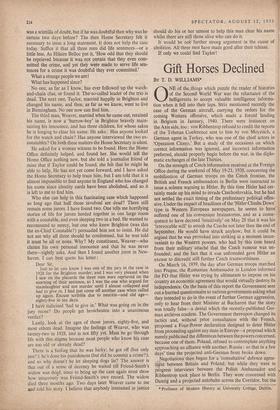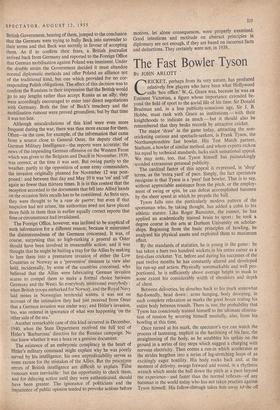Gift Horses Declined
BY T. D. WILLIAMS* 0 NE of the things which puzzle the reader of histories of the Second World War was the reluctance of the belligerents to accept valuable intelligence informa- tion when it fell into their laps. Strix mentioned recently the case of the German aircraft, carrying the orders for the coming Western offensive, which made a forced landing in Belgium in January, 1940. There were instances on the Axis side, too : von Ribbentrop refused to credit the reports of the Teheran Conference sent to him by von Moyzisch. a German agent in Turkey, who was one of the chief actors in `Operation Cicero.' But a study of the occasions on which correct information was ignored, and incorrect information preferred, should properly begin before the war, in the diplo- matic exchanges of the late Thirties.
On the strength of Czech information received at the Foreign Office during the weekend of May 19-21, 1938, concerning the mobilisation of German troops on the Czech frontier, the British and French ambassadors in Berlin were instructed to issue a. solemn warning to Hitler. By this time Hitler had cer- tainly made up his mind to invade Czechoslovakia, but he had not settled the exact timing of the preliminary political offen- sive. Under the impact of headlines of the 'Hitler Climbs Down' type in Western European newspapers, he seems to have" suffered one of his convenient brainstorms, and as a conse- quence to have decreed 'intuitively' on May 28 that it was his `irrevocable will' to smash the Czechs not later than the end of September. He would have struck anyhow; but it could be argued that he was provoked into striking at a moment incon- venient to the Western powers, who had by this time heard from their military attaché that the Czech rumour was un- founded; and the fact that it was unfounded gave Hitler an excuse to discredit still further Czech trustworthiness.
On March 16, 1939, the day after German troops marched into Prague, the Rumanian Ambassador in London informed the FO that Hitler was trying by ultimatum to impose on his country an economic agreement that would virtually destroy its independence. On the basis of this report the Government sent out a hurried questionnaire to various governments asking what they intended to do in the event of further German aggression, only to hear from their Minister at Bucharest that the story was totally false—a denial which the recently-published Ger- man archives confirm. The Government thereupon changed its tactics and, without prior consultation with the French, proposed a Four-Power declaration designed to deter Hitler from proceeding against any state in Europe—a proposal which merely publicised the differences between the powers concerned. because one of them, Poland, refused to contemplate anything approaching an alliance with another, Russia : so that in a few days' time the projected anti-German front broke down.
Negotiations then began for a 'consultative' defence agree- 'lit between Britain and Poland: but while they were in progress interviews between the Polish Ambassador and Ribbentrop took place in Berlin. They were concerned with Danzig and a projected autobahn across the Corridor, but the
* Professor of Modern History at University College, Dublin.
British Government, hearing of them, jumped to the conclusion that the Germans were trying to bully Beck into surrender to their terms and that Beck was secretly in favour of accepting them. As if to confirm their fears, a British journalist arrived back from Germany and reported to the Foreign Office that German mobilisation against Poland was imminent. Under the double strain the Government decided it must abandon normal diplomatic methods and offer Poland an alliance not of the traditional kind, but one which provided for no cor- responding Polish obligations. The effect of this decision was to confirm the Russians in their impression that the British would go to any lengths rather than accept Russia as an ally; they were accordingly encouraged to enter into direct negotiations with Germany. Both the fear of Beck's treachery and the mobilisation rumour were proved groundless; but by that time it was too late.
Although miscalculations of this kind were even more frequent during the war, there was then more excuse for them. Often—in the case, for example, of the information that came from a source close to General Oster, the deputy chief of German Military Intelligence—the reports were accurate; the news of the impending German offensive on the Western Front which was given to the Belgians and Dutch in November, 1939, was correct, at the time it was sent. But owing partly to the weather, partly, to the opposition of some army commanders, the invasion originally planned for November 12 was post- poned : and between that day and May 10 it was 'on' and 'off' again no fewer than thirteen times. It is in this context that the reception accorded to the documents that fell into Allied hands on the occasion Strix recalls has to be considered. As Strix says, they were thought to be a ruse de guerre; but even if that suspicion had not arisen; the authorities need not have placed more faith in them than in earlier equally correct 'reports that time or circumstance had invalidated.
The Foreign Office, however, was inclined to be sceptical of such information for a different reason; because it mistrusted the disinterestedness of the Germans concerned. It was, of course, surprising that, so high-ranking a general as Oster should have been involved in treasonable action; and it was thought that he might be baiting a trap for the Allies by seeking to lure them into a premature invasion of either the Low Countries or Norway as a 'preventive' measure (a view also held, incidentally, by some of the countries concerned, who believed that the Allies were fabricating German invasion scares to compel them to make a formal choice between Germany and the West). So everybody mistrusted everybody : when British troops embarked for Norway, and the Royal Navy laid mines in Norwegian territorial waters, it was not on account of the intimation they had just received from ,Oster that a German invasion was under way; and Hitler's invasion, too, was ordered in ignOrance of what was happening 'on the other side of the sea.'
Another remarkable case of this kind occurred in December, 1940, when the State Department received the full text of Hitler's `Barbarossa' directive for the Russian campaign. No one knew whether it was a hoax or a genuine document.'
The existence of an embryonic conspiracy in the heart of Hitler's military command might explain why he was poorly served by his intelligence; his own unpredictability serves as some excuse for the mistakes of the Allies. But the peacetime errors of British intelligence are difficult to explain. Ilse rumours were inevitable : but the opportunity to check them, and for delaying action until they were authenticated, should have been greater. The ignorance of politicians and the impatience or public opinion tended to provoke actions before motives, let alone consequences, were properly examined. Good intentions and rectitude on abstract principles in diplomacy are not enough, if they are based on incorrect facts and deductions. They certainly were not, in 1939..



































 Previous page
Previous page